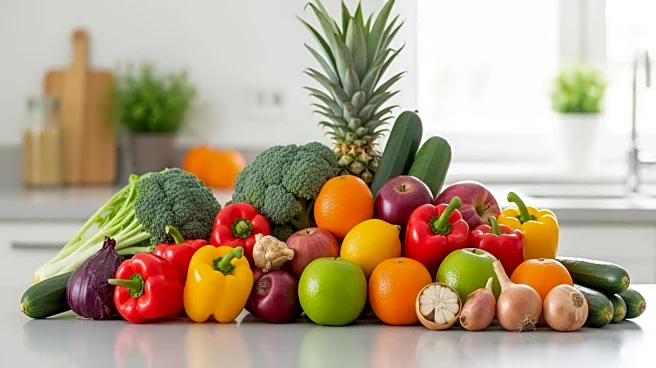What's Happening?
The food and beverage industry is experiencing significant growth driven by consumer interest in longevity and weight loss. According to recent research, the longevity market, currently valued at $23 billion,
is projected to reach $63 billion by 2035. This growth is fueled by an aging population that is increasingly focused on maintaining health and function rather than merely treating illness. Consumers are seeking products that support energy, cognition, and overall well-being. Functional foods featuring ingredients like medicinal mushrooms, adaptogens, and nootropics are gaining popularity in this space. Meanwhile, the weight loss market, valued at $142 billion, is expected to grow to $298 billion by the end of the decade. This sector is driven by consumers who prioritize science-led, results-driven solutions that fit their lifestyle. Brands are responding by offering products that combine high-satiety protein, fiber preloads, and glucose-steadying snacks with behavioral scaffolding and lifestyle-friendly formats.
Why It's Important?
The focus on longevity and weight loss reflects broader consumer trends towards health and wellness, impacting the food and beverage industry significantly. As consumers become more proactive about their health, they are demanding products that offer tangible benefits and align with their lifestyle goals. This shift presents a substantial opportunity for brands to innovate and capture market share by developing science-backed solutions that address these priorities. The emphasis on functional ingredients like medicinal mushrooms and adaptogens highlights a growing interest in holistic health approaches. For the weight loss sector, the integration of clinical-style bundles and lifestyle-friendly formats indicates a move towards personalized and effective solutions. This evolution in consumer preferences is likely to drive further innovation and growth in the industry, with potential benefits for both businesses and consumers.
What's Next?
As the longevity and weight loss markets continue to expand, brands are expected to further innovate by incorporating emerging ingredients and technologies. The focus will likely remain on developing products that offer multiple health benefits, such as improved cognition, stress resilience, and metabolic control. Companies may also explore new ways to engage consumers through personalized health solutions and digital platforms that track progress and outcomes. Additionally, the industry may see increased collaboration with healthcare providers and researchers to validate the efficacy of new products. As consumers increasingly prioritize long-term health, the food and beverage industry faces the challenge of delivering solutions that are both effective and accessible.
Beyond the Headlines
The rise of longevity and weight loss trends in the food and beverage industry may have broader implications for public health and wellness. As consumers become more informed and proactive about their health, there could be a shift towards preventive care and self-management of health conditions. This trend may also influence healthcare policy and the development of new health technologies. Furthermore, the focus on functional ingredients and personalized health solutions could lead to increased research and investment in the field of nutrition and wellness. The industry’s response to these trends may also impact cultural attitudes towards aging and weight management, promoting a more holistic and positive approach to health.










